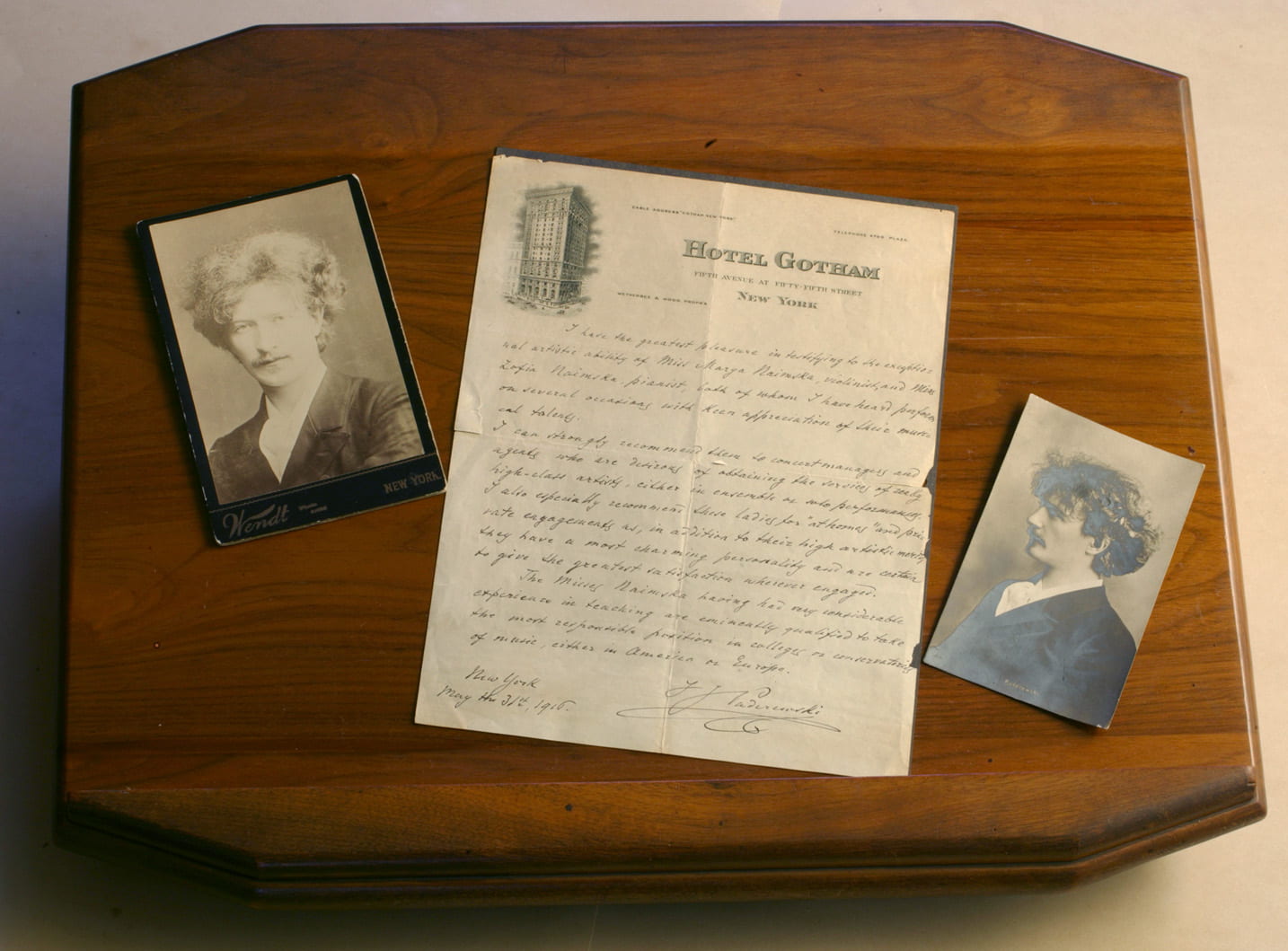Ignacy Jan Paderewski (1860-1941) was a pianist, composer, politician and philanthropist. The Paderewski Archive is an impressive resource with materials donated by several individuals over the past three decades. It originated with the PMC founder and first director, Wanda Wilk, who provided several early editions of Paderewski’s scores, books and artwork (including a caricature, cartoons and other similar materials). In the late 1990s the Center’s second director, Dr. Maja Trochimczyk, deposited a few historical photos of Paderewski, a draft of a personal letter, as well as postcards, press clippings and cartoons, and advertisements for Steinway, Victor-Victrola, Aeolian/Duo-Art and piano rolls. Also in the 1990s, Anne Strakacz-Appleton, daughter of Paderewski’s longtime personal secretary, Sylwin Strakacz, gave the PMC such items as Paderewski’s programs from his U.S. tours in the 1920s and 1930s, commemorative stamps, press clippings, and materials related to the Paderewski Festival in Paso Robles, CA.
The Paderewski Archive was substantially expanded with materials donated to the Center in 2008 by a private collector on Central Coast in conjunction with Anne Strakacz-Appleton. Over a thousand unique photos and negatives from Paderewski’s home in Switzerland and his visits in the U.S. (particularly in California), as well as cables, correspondence, concert programs and posters, documents relating to Paderewski’s honorary doctorate from USC (1923) and the film Moonlight Sonata (1937), were added to the collection at that time. Of special interest here are personal memorabilia (pocket watch, decks of playing cards, jewelry, articles of clothing, a suitcase with original tags), original artwork (including several portraits), historical maps, and musical manuscript fragments, that were also part of this gift.
Since then, the Paderewski Archive has expanded further with items belonging to persons in Paderewski’s household, including Helena Liibke, a longtime secretary to Helena Paderewska. They include a Kodak Brownie camera, several albums of photographs (with dates and names of subjects), and Helena Paderewska’s clothing items and jewelry. A fascinating album of photographs from the construction of the Trans-Siberian railway—a project supervised by Helena Liibke’s father—had also joined the Archive thanks to another generous donation by Ms. Strakacz-Appleton.
The Archive’s noteworthy holdings were augmented by items from the Lineback/New York Philharmonic Collection donated in 2007 through the good offices of Hanna Lachert in New York City. They included photographs of Paderewski, Helena Paderewska, and Ernest Schelling, as well as concert programs, press clippings, materials related to Paderewski’s aid to Poland during World War I, and other smaller items.
Several items in the Zygmunt and Luisa Stojowski Collection also relate closely to the Paderewski Archive, including scrapbooks of Paderewski’s press clippings from the U.S., a letter from Paderewski’s sister Antonina Wilkońska to Luisa Stojowska, and a score of Paderewski’s Symphony with indications of cuts by the composer entered by Luisa Stojowska.
Finally, the Archive also contains various magazines and periodicals from the first half of the 20th century (Etude, Life, Time, Saturday Evening Post, Ladies Home Journal, etc.) alongside numerous books on Polish history and literature from Paderewski’s personal library and from libraries of Sylwin Strakacz and Helena Liibke. Several of these books have been inscribed by the authors to Paderewski, his wife, Sylwin or Aniela Strakacz, Anne Strakacz-Appleton and Helena Liibke.
